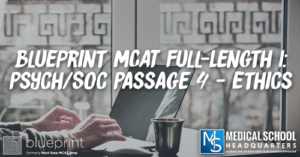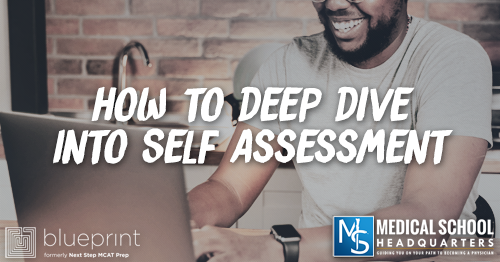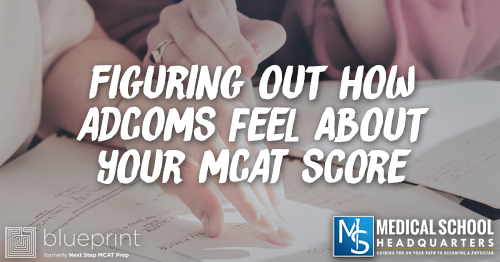Apple Podcasts | Google Podcasts
Session 233
This week, we dig into passage 4 of the Psych/Soc section! We read about professionalism and ethics before diving into the question set. Listen now to learn!
We’re joined by Dorothy from Blueprint MCAT. If you would like to follow along on YouTube, go to premed.tv.
Listen to this podcast episode with the player above, or keep reading for the highlights and takeaway points.
[01:38] General MCAT Tips
When you finish a set of discretes and you know you’re jumping back into a passage, Dorothy reminds students to make sure they’re not dwelling on precious sections.
'It's all about clearing the palate, just making sure that I'm not dwelling on previous sections. I'm not dwelling on the previous passages that I just read. And I'm ready to refresh.'Click To TweetDorothy recommends to spend a few seconds to take a deep breath, close their eyes, and get ready for the next passage. Then just knowing they have to start reading with high focus, intensity and motivation.
[03:03] Passage 4 (Questions 18 – 22)
Paragraph 1
98% of US medical students begin their first year by taking an oath to act with integrity and to uphold the responsibilities of the medical profession. This promise sets a high standard of behavior for them from the start of their medical education, but many medical schools fail to set or regulate similar ethical or professional standards for their faculty. This can result in maladaptive learning environments, in which students frequently observe and internalize disrespectful and unethical behavior toward patients, their peers, and other faculty.
Notes:
We’re talking about us medical students starting their first year and noticing perhaps some sketchy behavior. They’re noticing some ethical, professional standards that are set but maybe not always met. We sometimes see that these students are seeing disrespectful and unethical behavior towards patients, peers and other faculty.
From the get go, you can think about ethical professional standards and what might be related here. Notice we’re talking about these learning environments that might not be healthy or conducive to growing ethical and professional behavior for these students.
[04:47] Paragraph 2
One report of unprofessionalism in medicine found that 92% of practicing physicians had witnessed some kind of unethical behavior while in medical school but did not report it; the most common offenses are outlined in Table 1.
Table 1 Percentage of physicians who witnessed each type of unethical behavior
Notes:
There’s that statistic of seeing the behavior but not reporting it so that that behavior goes under the rug. Nothing is done about it.
Looking at Table 1, we’re seeing the percentage of physicians who witnessed each type of unethical behavior.
Just note that the information is there, and then we can just come back to it as needed, if we have a question related to it.
[06:42] Paragraph 3
The culture of medicine makes it difficult to fully understand how problematic unprofessionalism is – there is immense pressure to stay silent. Students are concerned that reporting incidents may result in retaliation, negative evaluations of performance, or damage to their career. Others believe that they must obey their superiors no matter what. Some faculty members believe that the unethical or unprofessional behavior of their peers is a normal aspect of the medical school experience that students must endure as a “rite of passage,” or feel such behavior is necessary when establishing successful medical practices.
Notes:
We’re talking about the culture of medicine and maybe how problematic it is. So I would probably highlight the culture of medicine in the beginning of that paragraph. Note “pressure to stay silent” as well. There’s this idea of obedience others believe that they must obey their superiors and maybe highlighting that bit as well. And the idea that there is a rite of passage to endure unethical or unprofessional behavior as well.
[09:13] Paragraph 4
It is important that students and physicians work together to challenge these implicit values. Leaders in medical education and practice must commit to improving professional conduct and establishing anonymous or confidential reports of offenses. If violators are forced to take responsibility and be accountable for their unethical behavior, they will be less likely to engage in that behavior in the future.
Notes:
Now, this paragraph is talking about things we can do in the future to perhaps better the learning environments for these students and physicians as well.
With CARS, it’s more about looking at the main idea and author opinions. But for the sciences, you want to make sure you understand the main idea. Look at the main topic and the things that were laid out. Then be able to summarize it in one or two sentences.
In this case, it would probably be that there are maladaptive learning environments and that students are noticing unethical and unprofessional behavior in the learning environment.
And then we have a table with frequencies of particular types of that behavior. We have this idea of maybe we should do something about it. Maybe we should have physicians and students work together to challenge these things and establish different ways to combat it, like the anonymous/confidential report. So the passage is pretty straightforward in terms of setting up the stage and looking at potential solutions as well.
[12:00] Question 18
Which of the following biases is least likely to have affected the review of professionalism?
- Reconstructive bias
- Social desirability bias
- Attrition bias
- Selection bias
Thought Process:
Attrition bias for me is over a long study when patients drop out and you lose them to follow-up, you have attrition. And that’s just a normal part of how research works.
It was just a survey. People were asked about their experiences. It’s just a one-time survey. There’s not really a research study, like a longitudinal time period for people to drop out of that study. And so, it’s not really relevant to the situation.
Correct Answer: C
[13:51] Question 19
Medical students may feel helpless when confronted with unethical behavior because they believe that reporting will have serious negative repercussions. As time goes by, they become more stressed and upset about the situation. What type(s) of stress are they likely feeling?
- Distress
- Eustress
III. Neustress
A.I only
B.II only
C.III only
D.I and III only
Thought Process:
Eustress is good stress. It’s a positive type of stress where you might find something challenging but it motivates you. Neustress is just a neutral type of stress. You’re exposed to something stressful, but it doesn’t actively or directly affect you. So, the answer here is obviously distress only.
Correct Answer: A
[16:43] Question 20
At one university, faculty members who behave unethically are required to have a meeting with the dean. After their meeting, their unprofessional behavior decreases. What process does this describe?
- Positive reinforcement
- Negative reinforcement
- Positive punishment
- Negative punishment
Thought Process:
When we talk about punishment, that means we’re decreasing the frequency of a behavior. So in this case, the unprofessional behavior is decreasing over time. And so that’s a good thing for us, because it’s a bad behavior that’s decreasing. The punishment is meant to decrease the behavior.
On the other hand, reinforcement is something that promotes or increases or encourages the frequency of a particular behavior. So it is punishment, because that behavior goes down in frequency.
Then positive means you’re adding something. In this case, it’s positive because they have to have a meeting with a dean. So we’re adding that meeting with the dean, rather than taking something away.
Positive punishment is adding something to decrease that behavior. Negative punishment would be taking something away from them to decrease behavior.
Correct Answer: C
[19:30] Question 21
What social phenomenon most accurately describes the experience of the physicians in the review?
- Deindividuation
- Social loafing
- Group polarization
- Bystander effect
Thought Process:
Bystander effect is where you are watching something happen, but you don’t really do anything about it for fear of whatever. And we have that effect here, because you’re seeing people not reporting it because they’re fearing they’re the consequences of that. In this passage, they witnessed it, but they also didn’t report it. They don’t do anything about it. And so inherently they are bystanders to whatever’s happening. So D is the answer.
A – Individuation is when you’re losing your sense of self and individuality, especially when in a group. It’s not acting in a way that you might normally act because you were giving up your individuality to whatever else is going on.
B – Social loafing is like you’re in a group project and someone slacks a bit because they just assume that everyone else can take up the reins for them. So you have less pressure to perform at a higher level because there are other people there that could pick up the slack for you.
C – Group polarization is when thoughts within a group move towards extreme ends after meeting with people who are like-minded.
Correct Answer: D
[22:25] Question 22
Which type of social influence do medical students experience when they engage in behavior that they privately feel is unacceptable and unethical, but that is considered normative in medical school?
A.Conformity
B.Obedience
C.Self-fulfilling prophecy
- Informational social influence
Thought Process:
Conformity is you’re conforming to the norms, even if you’re not comfortable with that peer pressure. So the answer here is A.
Correct Answer: A
Links:
SEARCH SITE
SEARCH SITE
LISTEN FOR FREE












